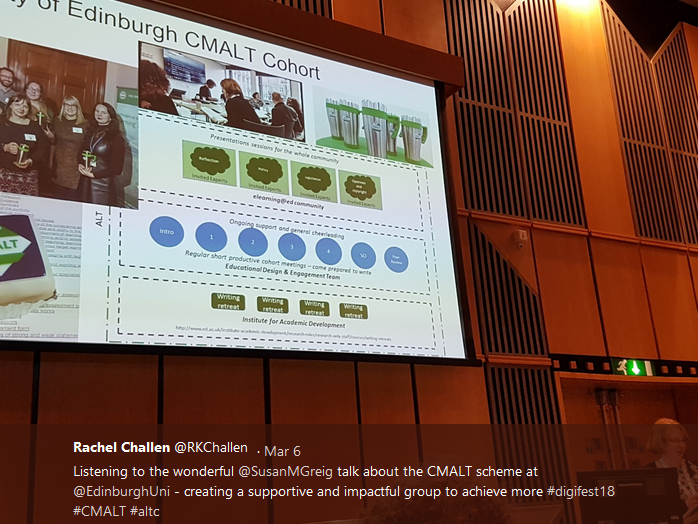The possibilities of education are fundamentally altered by networked technologies that mean physical co-location of teachers and students is much less relevant to teaching and learning and that digital resources can be easily copied and shared. This is the key context of my professional practice and the practice of those I support through CMALT.
CMALT applicants must write for assessors beyond their institution- including relevant context such as course level and student numbers. In addressing “Core area 3: The Wider Context” they show understanding and engagement with legislation, policies and standards in relation to learning and technology. Several pieces of legislation are relevant to all staff working in HE: Data Protection, Copyright, Intellectual Property Rights (IPR), Freedom of Information and Anti-Discrimination Law. However candidates can struggle with this section as they don’t immediately see how these are impacting on their work. Or understand that some of the working practices in HE are dictated by legislation – e.g. they are aware that you can only copy fractions of a printed book for students but don’t realise this relates to CLA licences. I started to host an annual CPD events on legislation open to anyone in the University community with invited speakers on aspects of the legislation and how his links to learning technology.
- 31/10/2016 Face your fears…. Legislation and Policies relevant to Learning Technology
- 26/10/2017 Lecture Recording – Legislation and Policy Considerations
A CMALT Holders from the group, Nick Daniels wrote about how this has influenced his practice:
“Putting together my CMALT portfolio helped me to take a step back from my work and think about how it fits into a wider context. For instance, I wrote in my portfolio about how considerations of copyright and open licensing changed the way we made MOOCs in our School.”
Certified membership of the Association for Learning Technology (CMALT) is primarily UK based with some international candidates – e.g. it partners with ASCILITE in Australasia. It is relevant to sectors beyond HE with holders, candidates and assessors are from Further Education (FE), schools and the skills sectors.
I am engaging with the wider ALT community, I sit on the Membership Development Committee (MDC) and Conference Committee, and this broadens my perspective of learning and teaching in HE and associated sectors – encouraging me to think beyond my own institution.
Engaging with ALT as their professional body, broadens their awareness of the wider context. I encourage them to attend the conferences, special interest groups or volunteer to sit on a committee. As this wider experience will give them perspective on their work within the University of Edinburgh.
I encourage CMALT holders to assess for insights into other peoples work and the context of their institutions.
As someone running a successful CMALT cohort I am invited to speak with other institutions who are planning cohorts:
- 11/12/2017 I advised a member of staff from Ulster University
- 19/03/2018 I advised members of staff from the University of Strathclyde.
I’m also invited to contribute to schemes of other institutions:
- 20/03/18 – CMALT Meeting (online) with the Irish Learning Technology Association to talk about mine and my cohorts experience of CMALT to a new group.
- 14/06/18 – I planned and delivered a 1 day CMALT Workshop for a new cohort at the University of Bournemouth. I wrote this blog post with follow up resources after the session.
Most schemes are opt in – applicants applying to join. However, Bournemouth CMALT group is for two teams of staff who have been brought together via an institutional restructure and staff felt they were required to do it. My impression was that this lack choice has had profound implications for the staff in Bournemouth. To engage with professional practice staff need to feel ownership of this. To address this during the session I introduced an activity on ‘motivation’ to consider that while this was an institutional directive – there were also personal befits to taking part. Giving staff a chance to express their misgivings and frustrations seems to be helpful in allowing them to move forward – I received this feedback by email from Debbie a week after the session:
“PS member of staff who was a little negative – written up his intro statement! “
I have also presented about my CMALT work to the broader HE community e.g. Deepwell & Greig 2018 – which was positively received:

I have a role in helping staff to understand the wider context of their work, both in CMALT and in ELDeR. In ELDeR workshops I talk with course and programme teams about what students will expect from the programme e.g. what their employment prospects will be. I’ve facilitated several ELDER workshops for courses with their own professional qualifications (medicine, nursing, vet) and CPD requirements that the university courses must meet.
References:
Deepwell, M. & Greig. S. (2018) Re-articulating what we value: a new vision for Learning Technology professionals, DigiFest 2018